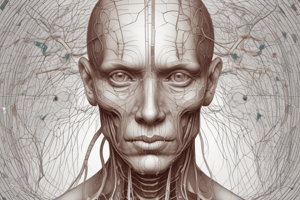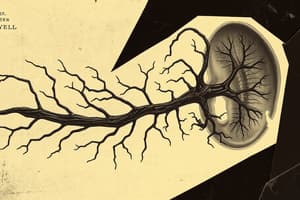Podcast
Questions and Answers
What structure begins forming the sensory neurons during the 6th week of embryonic development?
What structure begins forming the sensory neurons during the 6th week of embryonic development?
- Neural crest (correct)
- Embryonic layers
- Neural tube
- Fetal brain
During which week of development does the neural tube start forming the brain and spinal cord?
During which week of development does the neural tube start forming the brain and spinal cord?
- Week 8
- Week 4
- Week 2
- Week 6 (correct)
What is the primary function of the neural tube during embryonic development?
What is the primary function of the neural tube during embryonic development?
- To divide into embryonic layers
- To wrap around the head-end
- To form the body's sensory neurons
- To develop motor neurons (correct)
What does the head-end of the neural tube do as it grows?
What does the head-end of the neural tube do as it grows?
The nervous system is primarily influenced by what phase of development?
The nervous system is primarily influenced by what phase of development?
What role do gated Na+ channels play in neurons?
What role do gated Na+ channels play in neurons?
What is the primary function of interneurons in the central nervous system?
What is the primary function of interneurons in the central nervous system?
What do ependymal cells line in the brain?
What do ependymal cells line in the brain?
How are action potentials generated in neurons?
How are action potentials generated in neurons?
What is the significance of cerebrospinal fluid in the nervous system?
What is the significance of cerebrospinal fluid in the nervous system?
Which area of the cerebral cortex is primarily responsible for voluntary movement?
Which area of the cerebral cortex is primarily responsible for voluntary movement?
What function is associated with the Broca’s area in the brain?
What function is associated with the Broca’s area in the brain?
Which region of the brain is primarily involved in motivation and emotion?
Which region of the brain is primarily involved in motivation and emotion?
What is the main role of the medulla in the brainstem?
What is the main role of the medulla in the brainstem?
Which lobe of the brain is primarily involved with visual processing?
Which lobe of the brain is primarily involved with visual processing?
What does the dorsal root of the spinal cord mainly carry?
What does the dorsal root of the spinal cord mainly carry?
The function of the supplementary motor area is primarily to assist with what?
The function of the supplementary motor area is primarily to assist with what?
Which structure is part of the brainstem that connects to various pathways crucial for basic life functions?
Which structure is part of the brainstem that connects to various pathways crucial for basic life functions?
What is the primary function of the somatosensory cortex?
What is the primary function of the somatosensory cortex?
The central sulcus separates which two areas of the brain?
The central sulcus separates which two areas of the brain?
Which area of the brain is responsible for understanding speech?
Which area of the brain is responsible for understanding speech?
What type of matter in the spinal cord is primarily made up of axon tracts?
What type of matter in the spinal cord is primarily made up of axon tracts?
Which association cortex is involved in the planning and decision-making process?
Which association cortex is involved in the planning and decision-making process?
Which function does the cerebellum primarily serve?
Which function does the cerebellum primarily serve?
What is the primary function of oligodendrocytes in the nervous system?
What is the primary function of oligodendrocytes in the nervous system?
Which of the following correctly describes the role of the blood-brain barrier?
Which of the following correctly describes the role of the blood-brain barrier?
Which cells line the ventricles and are involved in producing cerebrospinal fluid?
Which cells line the ventricles and are involved in producing cerebrospinal fluid?
What protective structure surrounds the central nervous system (CNS)?
What protective structure surrounds the central nervous system (CNS)?
What is the main role of microglia in the central nervous system?
What is the main role of microglia in the central nervous system?
Which region of the brain is known for fine-tuning muscle activity?
Which region of the brain is known for fine-tuning muscle activity?
Which structure is primarily involved in the relay of sensory information?
Which structure is primarily involved in the relay of sensory information?
What is the role of astrocytes in the blood-brain barrier?
What is the role of astrocytes in the blood-brain barrier?
What substances are absorbed into the spinal column?
What substances are absorbed into the spinal column?
Which part of the brain is known as the seat of homeostatic control?
Which part of the brain is known as the seat of homeostatic control?
Which layer of the meninges is known as the 'gentle mother'?
Which layer of the meninges is known as the 'gentle mother'?
Which of the following correctly describes cerebrospinal fluid?
Which of the following correctly describes cerebrospinal fluid?
What type of cells are responsible for forming the blood-brain barrier?
What type of cells are responsible for forming the blood-brain barrier?
What does the term 'white matter' refer to in the context of the brain's structure?
What does the term 'white matter' refer to in the context of the brain's structure?
Study Notes
Development of the Nervous System
- Nervous system development is determined by embryonic layers.
- By week six of development, the neural crest forms and develops into sensory neurons, and the neural tube develops into the brain, spinal cord, and motor neurons.
- In the fourth week of development, a portion of the top layer pulls into the middle layer to form the nervous system.
- The neural tube divides into segments over the coming weeks to form the fetal brain and spinal cord.
- The head-end of the neural tube wraps and twists around itself as it grows to form a newborn brain.
Layout of the Mature Nervous System
- The mature nervous system is comprised of the central nervous system (brain and spinal cord) and the peripheral nervous system.
Cells of the Central Nervous System
- The central nervous system is comprised of neurons, glial cells, astrocytes, and microglia.
- Neurons perform action potentials and synapses.
- Oligodendrocytes form myelin sheaths around axons.
- Ependymal cells line the ventricles of the brain and spinal cord.
- Astrocytes form the blood-brain barrier, and they are comprised of endothelial cells.
- Microglia are responsible for brain defense and housekeeping.
The Blood-Brain Barrier
- The blood-brain barrier is formed by endothelial cells in capillaries in the brain and spinal cord.
- Astrocytes send projections to capillaries which cause tight junctions to form.
- The tight junctions prevent substances from moving around cells, so they are only able to move through cells via membrane transport mechanisms.
Protective Layers of the Central Nervous System
- The CNS is protected by the skin and sensory nerves, the skull and vertebrae, the meninges, and cerebrospinal fluid (CSF).
- The meninges consist of three layers: dura mater, pia mater, and arachnoid mater.
- The cerebrospinal fluid cushions the brain and spinal cord, provides nutrients, and removes waste products from brain tissue.
Regions of the Central Nervous System
- The central nervous system is comprised of the brain and the spinal cord.
- The brain is comprised of the cerebral cortex, basal nuclei, thalamus, hypothalamus, cerebellum, midbrain, pons, medulla, and the pituitary gland.
- The cerebral cortex is responsible for thought, consciousness, movement, and integration.
- The basal nuclei fine-tune muscle activity and inhibit inappropriate actions.
- The thalamus is the relay center for all sensory information except the sense of smell.
- The hypothalamus is the seat of homeostatic control, and it is the master gland of the endocrine system.
- The cerebellum is responsible for coordinating movements and muscle memory.
- The brain stem consists of the midbrain, pons, and medulla; and it controls many basic processes essential for life, such as digestive centers, respiratory centers, and cardiovascular centers.
- The pituitary gland produces many regulatory hormones.
- The spinal cord contains nerve pathways and reflexes.
The Cerebral Cortex is Divided into Lobes
- The cerebral cortex is divided into the frontal lobe, parietal lobe, temporal lobe, and occipital lobe.
- The frontal lobe contains the prefrontal association cortex (planning, decision-making, personality traits), the premotor cortex (coordination of complex movements), the supplementary motor area (programming complex movements), and Broca’s area (speech formation).
- The parietal lobe contains the somatosensory cortex (somesthetic sensation and proprioception), the central sulcus, and the posterior parietal cortex which integrates somatosensory and visual input, and is important for complex movements.
- The temporal lobe contains the primary auditory cortex (hearing), the Wernicke’s area (speech understanding), and the limbic association cortex which is responsible for motivation, emotion, and memory.
- The occipital lobe contains the primary visual cortex (sight).
The Spinal Cord
- The spinal cord consists of white matter which contains tracts of axons, and gray matter which contains many interneurons.
- There are 30 pairs of spinal nerves which are part of the peripheral nervous system.
- Sensory information travels from sensory receptors via action potentials from the dorsal root to the ventral root.
- Motor information travels via action potentials from the ventral root to effectors.
Studying That Suits You
Use AI to generate personalized quizzes and flashcards to suit your learning preferences.
Related Documents
Description
Explore the intricate processes involved in the development of the nervous system, from embryonic layers to the formation of the brain and spinal cord. Understand the key components of the mature nervous system, including its cellular makeup and functions. This quiz tests your knowledge on the development and structure of the nervous system.



